Novi Vinodolski has received the Special Prize for Non Implemented Work and the Best Spa Prize in Hotel Design Awards 2015.
Text by the architects
The brief called for the design of a 4* hotel in Novi Vinodolski, Croatia, on a plot of approximately 3,800m2, situated between a local marina on the northwest and the sea on the south, in an area currently undeveloped and disconnected from the city`s front promenade and the rocky beaches and sea. Although the town is dominated by the tourist industry, the plot was left unused due to previous demolitions, and the regeneration of the entire area was required in order to create a new center of attraction for both travelers and the local community.
The brief called for a hotel, approximately 6,800m2, consisting of 70 rooms with indoor and outdoor common areas such as a restaurant, bar, multi-functional room, wellness center, outdoor pool, retail and parking spaces in the basement. Introducing communal activities and extending the life of the hotel to the beach, whilst allowing locals and visitors to come together to enjoy a charming sea front promenade, were highlighted in the brief.
Our proposal was inspired by the unique stepped landscape of Novi Vinodolksi and its geographical section, which unfolds from the mountains down towards agricultural land, the historic town center, and finally to the promenade, the beach and the deep blue water of the sea. The proposal aimed to enrich guests` experience by layering different operational functions to allow for smooth but defined transitions between public, social, and intimate spaces, as well as open views and contemplative enclosures, formal piazzas and sheltered terraces that open to the sea.
Inspired by the two distinct urban situations at the border of the plot, namely the bustling marina and the calm sea, an animated and homogeneous facade consisting of folding aluminum shutters that filter light was proposed. The shutters are placed along the boundary of the building and on secluded marina-facing balconies to enhance guests` privacy, whilst on the west elevation the shutters can be folded back to open rooms out to large balconies and views of the sea.
The openness and grandeur of the Piazza creates an arrival at the heart of a new social hub on the waterfront. Ancient olive trees and a reflective pool frame the hotel’s main entrance and the views of the sea, whilst the piazza operates as the hotel’s urban frontage, a vibrant public destination.
Fragrant plants signal the threshold as guests are welcomed into the tranquility and calm of the hotel interior. The interiors of the hotel, influenced by its natural settings, fuse contemporary design with vernacular materials to create natural, modern interiors with a strong sense of place. An oak paneling with light integrated, wrapping around the common areas and transformed to a sculptural staircase that leads to the rooms and the pool, seated on a bespoke marble-based floor. All proposed materials are high quality, locally sourced natural materials while craft and construction methods firmly ground the design in the region and provide continuity between the hotel`s natural and historical surroundings and its more contemporary cultural context.
Landscaped terraces gently fragment in layers from the clean lines of the architectural façade. These private hotel terraces elevate the guest above the busier public realm, ensuring uninterrupted views to the horizon. Here too, agricultural references, including herbs and olive trees, provide enclosure, intimacy, and separation from the public realm.
Istrian limestone paving provides a high quality surface for the arrival road and Piazza. The limestone anchors the base of the building to the Piazza and wraps the hotel terraces. Strategic placement of a timber boardwalk, dining platforms, decks, and temporary lounges provide a warm texture to add to the landscape.
Facts & Credits:
Architects: Divercity – Nikolas Travasaros, Christina Achtypi, Daniel Silva, Yun Wan, Kirsty Williams
Landscape Architects: Scape Design Associates
Interior Designers: Carole Topin
Leed Consultants: XCO2 Energy
Carbon Profiling: Sturgis Carbon Profiling (SCP)
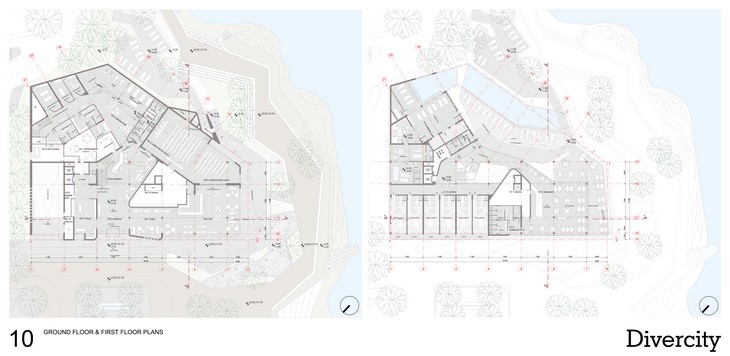 .
.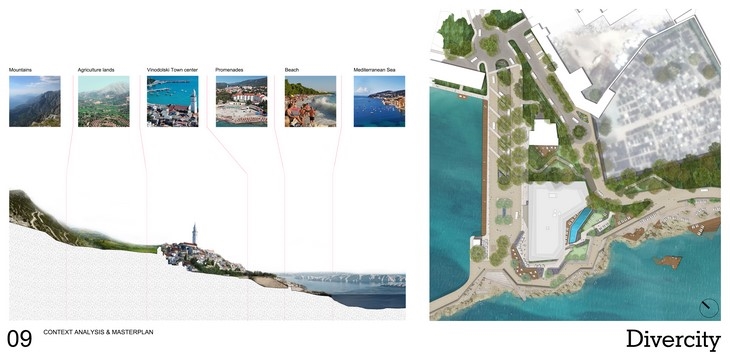 .
.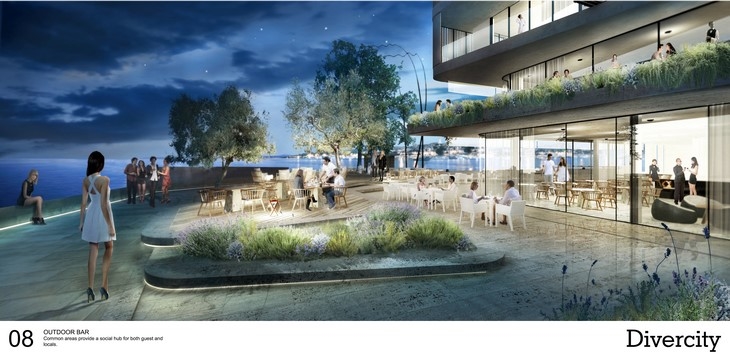 .
.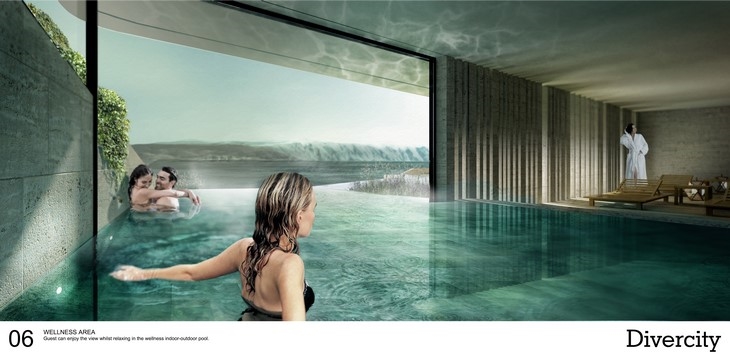 .
.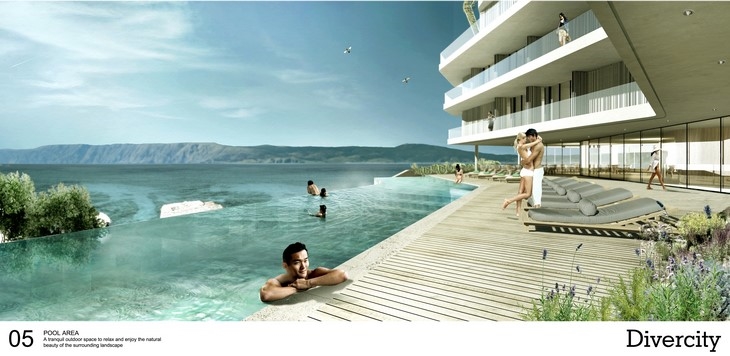 .
.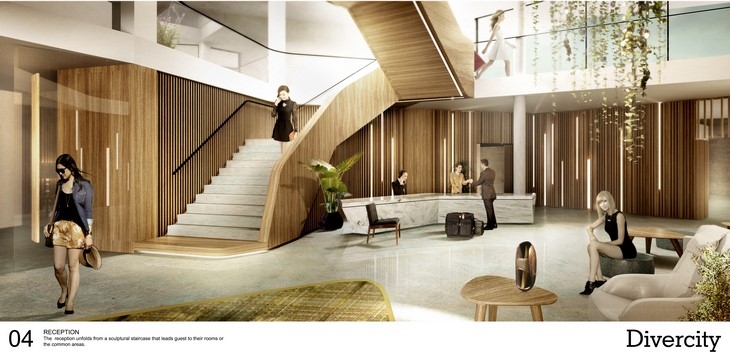 .
.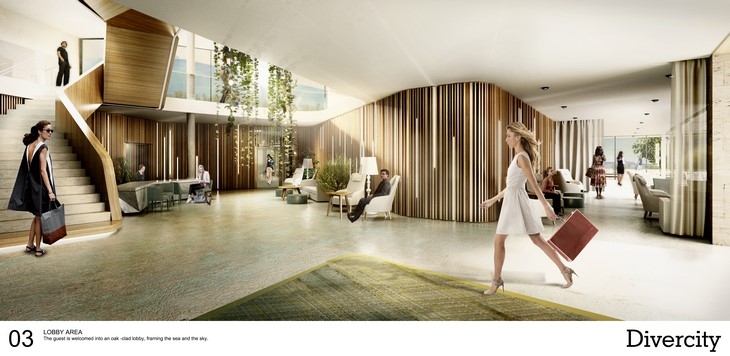 .
.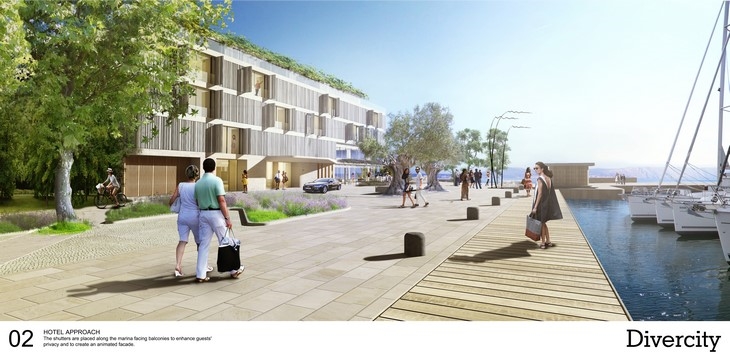 .
.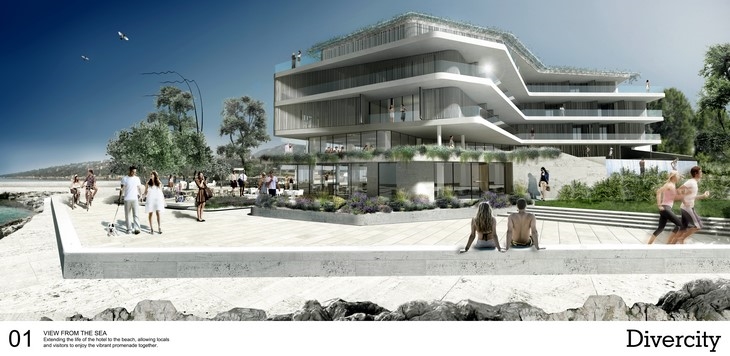 .
.READ ALSO: BENTHEM CROUWEL INSTALL AN 80.000 TILE MURAL IN AMSTERDAM'S CENTRAL STATION